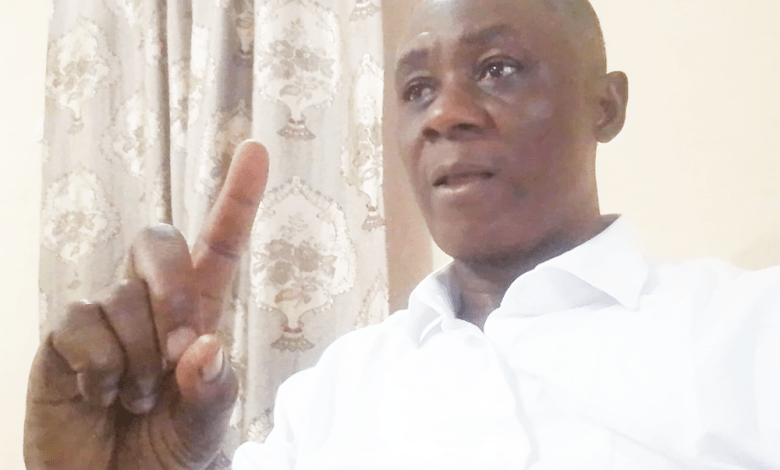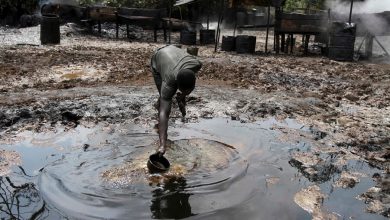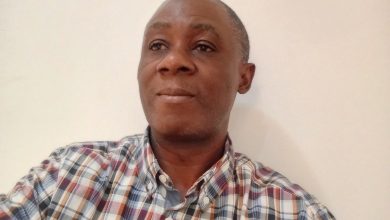Oil exploration in Ogoniland: What Ken Saro-Wiwa instructed before he died – Fegalo Nsuke

President of the movement for the survival of Ogoni people, MOSOP, Fegalo Nsuke has said that the Nigerian government is losing as much as N42billion revenue daily for non-exploration of oil in Ogoniland for the past two decades. In this interview with DANIEL ABIA, he regrets the devastation of Ogoni environment and enjoins government to embark on proper negotiations with Ogoni stakeholders.
Excerpts:
It is about 30 years since the international oil companies, IOCs, stopped oil explorations in Ogoniland, when do you think is most appropriate to resume oil business in Ogoni?
We understand that Ogoni’s oil production capacity stands at not less than 500,000 barrels per day. That means, an estimated N42billion in daily revenue and that excludes our enormous gas potentials which is even more than the oil. Within the oil sector, Ogoni is described as a gas field with some oil but because we have some more reliable data on the oil production capacity and little on the gas, we seem to speak more on the oil. In reality, Ogoni’s gas revenue will far exceed that of the oil. So, putting them together, you can imagine the opportunities that lack of negotiations have cost all of us. It is really painful for us that despite these enormous oil and gas potentials, Shell operated in Ogoni for 35 years and all we see is our oil and gas reflecting in other places like Lagos, Abuja, Enugu, Kano and so on while we, the Ogoni people are dying. We cannot build an Ogoni economy to cr eate jobs. There are no efforts to build Ogoni infrastructure, provide security, care for our old people and give the people a good life. The conflict with Shell was because the people were pushed to the wall and they could no longer bear it. What we call the Ogoni struggle today is actually Ogoni’s way of seeking attention in search of a solution to the neglect. It was Ogoni’s way to express its rejection of a situation where the Ogoni people were left to grapple with the consequences of natural resource extraction while revenue from Ogoni were being shared among the 36 states of the federation.
The good news is that MOSOP has now proposed the operation of an Ogoni Development Authority, ODA, and once this proposal is negotiated and operationalized, MOSOP will guarantee that oil will flow in Ogoni again within six months. I am being very realistic here. When it comes to the mandate to protest the injustices done to Ogoni, MOSOP was mandated to make those protests and Ken Saro-Wiwa instructed before his death that oil production should not be allowed in Ogoni until it is properly negotiated. The ODA is an opportunity to negotiate a resolution of these issues. For us, Ogoni wants a secured future which has to be built on a guaranteed investment in Ogoni and that investment should be from a negotiated proportion derivable from Ogoni’s enormous natural resources.
What is your assessment of the cleanup exercise by HYPREP almost five years since former President Muhammadu Buhari flagged off the exercise in June 2018 at Bodo City, despite the US$1billion initial takeoff fund by the joint ventures?
If they were actually doing a cleanup, by now, they would have been done with cleaning both surface and underground water pollution. Pollution would no longer have been an issue. One very fundamental issue is that there can be no remediation without compensation for livelihood losses. You do not destroy people’s lives and walk away without penalties. You must compensate the people for the damages they have suffered. So what is going on in the Hydrocarbon Pollution Remediation Project {HYPREP} is a fraud, complete deception and we completely condemn it.
How can a cleanup programme begin with the spending of some N700,000 on the smallest sites without paying any compensation for the destruction of livelihoods and the polluted water which has affected the people’s health being their only source of drinking water?
They abandoned the people and went for the contracts that put money in their pockets even when the United Nations Environmental Program, UNEP, reports strongly highlighted the need for water provision and the health issues as emergencies. Now, the project coordinator built a small bore hole in his own village which does not have a single oil spill incident and HYPREP is celebrating that as water provision for Ogoni. It is all deception.
There were seven oil spills in Ogoni between 2022 and 2023 alone and the devastation has been huge. Who, in your opinion is the culprit in this environmental disaster and what remedy will be soothing enough for the victims?
Shell is the polluter and that is one reason Ogoni strongly regrets allowing Shell into the land. Shell did not only exploit our resources and pollute our lands, they also funded the massive killing of our people in the 90s. The very painful aspect is that Shell is still allowed to cause more damage to Nigeria and no punitive measures had been taken against the company for all her crimes. Going forward, the solution lies in the operation of our proposed Ogoni Development Authority {ODA}.
With the design and structure we have in place we will take responsibility to clean the land and work with the would-be operator to achieve our development goals. On the part of Shell, what we expect is that they will properly clean up the polluted sites and compensate those who have been affected by these spills and ensure that their pipelines are safe within our communities. They know the environmental impact of their operations and we will expect them to prevent those negative occurrences.
MOSOP is clamoring for Ogoni Development Authority, ODA, what is the takeoff capital you are looking at and how will the authority turn around the fortunes of the Ogonis?
The ODA is a proposal to government as an acceptable path to permanently resolve the Ogoni crises. We looked at the Ogoni Bill of Rights and saw that the demands were essentially issues of underdevelopment.
We then drafted the ODA and I met with all chapters of MOSOP and kingdoms of Ogoni to discuss it. The final stages involved the Executive Committee and the Central Committee of MOSOP which finally voted to approve the proposal on September 27, 2020.
The proposal became our prescription and an acceptable pathway to resolve the Ogoni problem and open up a new era that will drive massive development for our people. The whole idea is to get an agreed proportion of the resources derived from Ogoni to be committed to Ogoni development so we can address the problems of unemployment, infrastructural development, security, education, health and all that. That is the whole essence of the Ogoni struggle and it is what MOSOP demanded from the beginning but unfortunately, MOSOP was largely misunderstood and instead of addressing the problem, Shell encouraged the government to kill our people.
The proposed take off capital is that 25 percent of the revenue derived from Ogoni resources should be committed to Ogoni development. That will be enough to create jobs, achieve our aspirations as a people, secure the future of Ogoni children and the beauty of it is that it is a win-win for the Nigerian people. Imagine the huge revenue that will trickle into the federation account from 500,000 barrels daily oil production and the sale from our enormous gas resources.
I think what we have done is a great opportunity for the government and the Nigerian people. The benefit will also go to the state because 13 percent of that will be paid to the state and all these will impact the entire nation at all levels including the local governments.
After 62 years of environmental degradation and pollution, MOSOP-USA wants Ogoni to be upgraded as a state. What are the indices that qualify Ogoni as a potential state in terms of demography, economic potentials among others?
The issue of a state for Ogoni is not new. That is what political autonomy means within the context used in the Ogoni Bill of Rights. What MOSOP USA has said is just a reinforcement of the demands of MOSOP. MOSOP USA is a formation of Ogonis who were forced into exile during the repressive years.
In terms of demography, the population of Ogoni which stands at an estimated 1,200,000 people today is more than the population of the Vatican City, Monaco, Nauru, Malta, Maldives and several other independent states who are members of the United Nations. So it is not out of place for Ogoni to be preserved in their own territory as a distinct ethnic nationality within Nigeria, a people who are endangered by the fact that nowhere else on the surface of the earth will you find an indigenous Ogoni settlement.
The demand for an Ogoni or a Bori State is simply a demand for the rights of the Ogoni people to function within Nigeria as the Ogoni people and not something extraordinary. Even if we were less than 10,000 people, our identity should be preserved and we should have a state of our own. Today, we are endangered because we are unable to set our priorities within our recognized territory, we are unable to develop our languages and take responsibility for our own future and that is a problem. In terms of economic potentials, Ogoni is one of Nigeria’s naturally endowed lands and our resources are massive with oil revenue exceeding N42 b per day. Ogoni can generate more revenue than 20 Nigerian states put together. So, not granting that right to self-determination is a significant error especially given our distinct identity. But while that is part of the issues to be addressed, we will follow the processes when the time comes. Our primary focus now is survival and the Ogoni Development Authority is something we want this minute.
Do you think MOSOP under your watch is as effective as MOSOP of Ken Saro-Wiwa era?
No two situations can always be exactly the same. Our population has changed and with the increase in population, there is more pressure on available resources.
There has been little or no investments in Ogoni so we have one of the highest rates of unemployment in the country today. We actually face different complex challenges compared to 30 years ago. So a straight answer to your question is very difficult. However, the good news is that the struggle is alive and we have also made a lot of progress especially with our recent focus on development.
We all need to understand that whatever we are doing today is in pursuit of the same goals and aspirations of our founding fathers notably Hon. T N. Paul Birabi and Ken Saro-Wiwa. I have always told the Ogoni people that leadership is about solving problems and not escalating it. Saro-Wiwa massively mobilized with a lot of documentation to pull the Ogoni out of their sleep so they can understand the extent of their deprivations. You will see that, that goal was well achieved and the entire world did acknowledge the Ogoni situation.
After Ken, you will notice that things changed and tended towards engagement though we did not get what we wanted. So it is a struggle to break free and the oppressors are fighting also to keep us where we are but unfortunately for them, Ken’s civic education has given a lot of enlightenment and we know what we want. Within the context of MOSOP, we must acknowledge that after the death of Saro-Wiwa, there would have been no MOSOP, if not for the leadership that emerged. Again, that was another tough period because the leadership was exiled and we must commend those who stayed back to sustain the agitation and keep Shell away.
So, generally speaking, the environment has changed significantly but we are simply pursuing the same goals and no one should expect that we will abandon our goals or betray the sacrifices of the martyrs. In trying to answer your question more specifically, I would say we have not lost focus, we are pursuing the same goals Saro-Wiwa and the others pursued and I also think our recent proposals for the operation of an ODA makes the achievement of our goals more realistic within the context of today’s Nigeria. Things are much more different today.
For example, under Ken Saro-Wiwa and up till 1999, the creation of an Ogoni state could have been easier with a military decree. The system needed significant pressure to achieve that goal. Today, we have a constitutional democracy with just one representative in the senate of 109 members and 3 representatives in the House of Representatives of over 1,700 members. That means in reality that pushing any Ogoni interest bill in the National Assembly is almost dead on arrival. So we have to rely on dialogue for a political solution.
But we have an advantage which is our huge natural resources and we have to take advantage of our resources. They have to give us what we want and we give them what they want which we have kept for 30 years. By the end of the day, we are all happy because it is a mutually beneficial deal. The position of MOSOP is that things cannot continue to be the way they are now with one party smiling and the other party left in perpetual pain and misery. What is most important is that we are able to achieve our collective goals even though our strategy may be different.
The situation has changed significantly but we have kept our eyes on our goals and that remains our focus. So, the comparison is unnecessary because a lot have changed. Under T. N. Paul Birabi, intellectualism played a key role and you will find that Birabi excelled within the Ibo dominated Eastern parliament because he was a genius. Under Saro-Wiwa, he mobilized to pull Ogoni out of their dormant state and let them know they were cheated.
Under Barr Ledum Mitee, his key task was to sustain the struggle after Ken’s death and today, we are focused on actualizing the Ogoni Development Authority which is the actionable part of the Ogoni Bill of Rights. So we are now narrowing down to our specific demands which brings a lot of hope to the people and this makes the actualization of our dreams more realistic. We will only continue to take advantage of the strength we have gained from the efforts of the past and I think we will get there sooner than late




